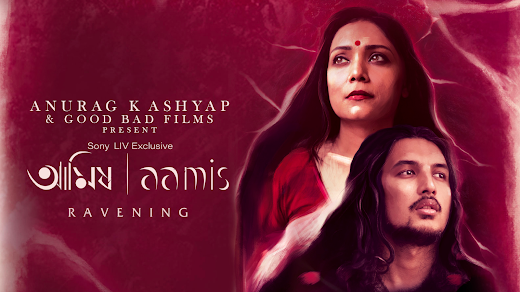Aamis (2019): An Insane Thriller Disguised as a Platonic Love Story
"TW: This movie isn't for the faint-hearted." might seem like an understatement if you don't feel disgust or discern morality.
Bonding over their shared love for "meat," two people navigate a complex web of emotions, unconventionally reiterating love and redrawing boundaries. Things take a wild turn when one desires to relish the 'forbidden meat' (read: human flesh) and the other fervors to fulfill this intense desire.
"Aamis" is an irresistibly insane Assamese film that was released in 2019. Directed by Bhaskar Hazarika, the film gained widespread recognition for its unique and thought-provoking storyline, which explores the complex and taboo subject of unconventional love and desire in contemporary society. Hazarika sets his story and its major protagonists in a middle-class society where the mundane, monotonous, and dull routine seeks thrills.
The title "Aamis" translates to "The Ravening" in English, and it serves as a metaphor for the central theme of the movie. After a chance encounter, the widely separate worlds of both Sumon and Nirmali come together. It tells the story of Nirmali, a young, married woman who is a pediatrician by profession, and Sumon, a young Ph.D. student who specializes in the study of meat consumption in various cultures. They meet each other and converse about their shared passion for food.
The performances and chemistry of the lead actors, Lima Das (Nirmali) and Arghadeep Baruah (Sumon), are commendable. They bring depth and authenticity to their characters, making the audience empathize with their unorthodox love story.
As Nirmali and Sumon's relationship deepens, it takes an unexpected and controversial turn. They develop a unique and intense bond through their shared love for exotic and taboo meats. This unusual relationship challenges societal norms and questions the boundaries of love, desire, and morality.
The film beautifully captures the cultural and scenic backdrop of Assam, adding depth to the narrative. The lush green landscapes and rich culinary traditions of the region provide a stark contrast to the film's dark and provocative subject matter. The cinematography by Riju Das brilliantly complements the storyline, enhancing the overall visual experience, Together this has solidified "Aamis" as a significant contribution to Indian cinema.
There's a scene when Sumon recounts an incident from his childhood. "My father gave me a chicken to look after, It was beautiful, and I continued to care for it until one day he requested that I kill the creature so that we could eat it." "You didn't feel bad?" Nirmali asked, to which Sumon answered. "I tried, but I gave in to hunger."
In another segment, Sumon mentions a specific kind of insect that produces an unpleasant smell yet is consumed in certain parts of the country. "You must squeeze the poison out of the insect before it can be served on our tables," Sumon instructs. In the movie, poison becomes symbolic of our society's attention to the relationship between them. It's solid when the two stand amidst a movie theatre hallway, gazing at each other while the audience walks out of the theatre.
Aamis also makes us question what's normal. During the dinner sequence, when Dilip, Nirmali's husband, makes a derogatory offhand comment about the eating habits of a community, Sumon subtly states, "The definition of normal isn’t universal."
From their conscience overpowering their wants to obsession controlling their needs, the self-aware characters suddenly turn out to be hypocrites. With Nirmali denying her non-platonic desire when confronted by Jumi, and Sumon failing to leave the city and stopping mid-way only to go back to Nirmali's for the house party, their unfulfilled desires are slowly being fed (quite literally).
Nonetheless, the film's ironies are the most intriguing moments. For instance, when Nirmali serves the same unusual (or creepy, maybe) meal, Sumon is unable to eat it because he recognizes the recipe. He vomits the food and expresses how ridiculous the obsession is. And, in one of the first scenes, Nirmali asserts that meat-eating isn't a major deal, but gluttony, or excessive food intake, is. Yet, in the end, you realize that they aren't very different, and it's the same hunger and gluttony that later comes to backstab them.
In a nutshell, "Aamis" is a delicious thriller disguised as a platonic love story.











Comments
Post a Comment